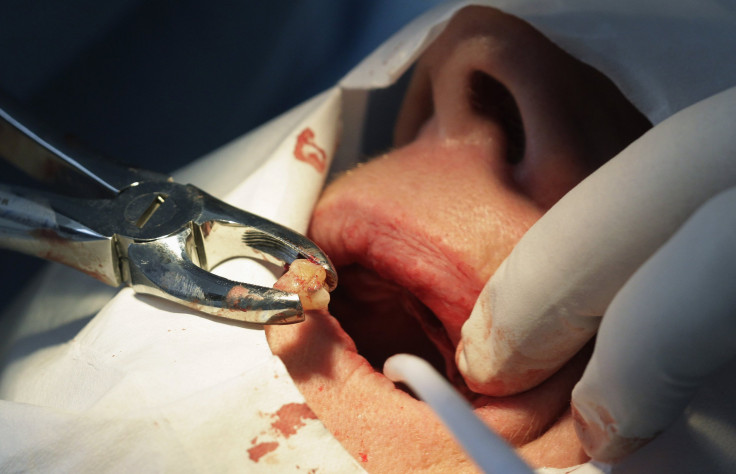Risk Of Tooth Decay Increases With Mouth Breathing; Brushing Teeth Twice A Day May Help

If you've ever woken up with a dry, cotton-like mouth, chances are it's probably because you've slept with your mouth open. It may seem like a harmless issue you can easily fix with a glass of water, but according to a study published by Journal of Oral Rehabilitation, it could indicate future dental problems. Apparently people who sleep with their mouths open have a greater risk of tooth decay.
Study authors from the University of Otago's Sir John Walsh Research Institute in New Zealand took 10 healthy participants and fitted them for mouth pieces in order to measure pH levels in their saliva over four days — pH can determine the acidity or basicity of a water-based solution, like saliva. During the experiment, authors had half of the participants wear a nose clip to stimulate mouth breathing. And the results showed participants forced to breath through their mouth had an average pH level of 6.6, which is considered acidic.
"Intraoral pH decreased slowly over the hours of sleep in all participants, but showed greater falls over a longer period of time when participants were forced to mouth breathe," Joanne Choi, doctoral candidate and lead study author, told Tech Times.
Choi and her team also found that when participants were forced to breathe through their mouth at night, their pH levels dropped to 3.6. The tooth starts to lose its minerals when pH levels drop below 5.5, Choi said.
Saliva coats teeth to protect against decay, but with fewer minerals, protective benefits will decrease, dentist Hargun K. Singh, of The University at Buffalo, told Medical Daily.
"Acid-producing bacteria thrive in the absence of saliva. Acid breaks down our teeth causing cavities and irritates soft tissues in the oral cavity. Saliva production decreases at night, so mouth breather’s are at an increased risk for symptoms of dry mouth, cavities and gingival inflammation," said Singh, who was not involved with the study.
Tooth sensitivity, bad breath, discolored spots on teeth, as well as bad taste in the mouth are all symptoms of tooth decay, Tech Times reported. Without proper treatment, tooth decay can lead to "more serious dental problems, including dental abscesses and gum disease."
This is why it's important for patients with dry mouth to figure out the underlying cause of the issue. Singh said a number of issues have been attributed to chronic mouth breathing, including nasal congestion, sleep disorders, and a person's anatomy.
Chronic mouth breathing also emphasizes the importance of oral hygiene.
"Being extra vigilant about brushing twice a day for two minutes with a fluoride-containing toothpaste and flossing at least once a day is necessary to prevent cavities," said Singh.
Source: Choi J, Waddell J, Lyons K. Intraoral pH and temperature during sleep with and without mouth breathing. Journal of Oral Rehabilitation. 2015.



























